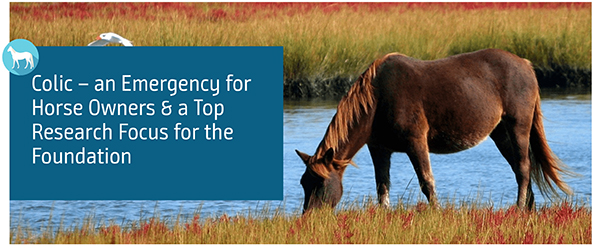
Colic- An Emergency for Horse Owners and Top Research Focus For Animal Foundation

Morris Animal Foundation
If you were to ask a horse owner or veterinarian their greatest equine health concern, the answer might surprise you. Foot and leg injuries are devastating in horses, but that’s not what keeps owners up at night.
Surveys of horse owners and equine veterinarians conducted by Morris Animal Foundation and the American Association of Equine Practitioners show colic (abdominal pain due to any cause) is what those who know horses best worry the most about.
Colic is common in horses because of their specialized digestive tract, which differs from other grazing animals, and it doesn’t take much to throw the system off balance. Many things can cause colic, but the most common are:
- Stretching of the intestinal wall (usually by gas or partially digested food)
- Twisting of the intestine
- Intestinal blockage (sand, parasites, feedstuffs and foreign materials are frequent culprits)
- Inflammation or ulceration of the gastrointestinal tract
Experts say 4-10% of all horses will experience at least one episode of colic in their lifetime. Most cases can be resolved on the farm with medical treatment, but approximately 10-15% of cases need advanced care. For horse owners, colic can be a frightening diagnosis. For veterinarians, colic can be a challenge to treat when a horse’s condition rapidly worsens. Severe cases can lead to difficult decisions about euthanasia. Even in the best-case scenario, treating colic can be costly for horse owners.
The prognosis for horses diagnosed with colic has improved, but many equine veterinarians and horse owners hope more can be done to improve outcomes for horses suffering from colic.
Newly Approved Colic Studies Address a Pressing Need
Recognizing the need for additional investment in this critical health concern, the Foundation announced a call in 2021 for equine research proposals focused on colic. Colic experts from around the world responded, with 23 proposals reaching the final round of evaluation. The Foundation’s Large Animal Scientific Advisory Board reviewed all submitted grant applications and selected, based on scientific merit and impact, the studies with the greatest potential to save lives, preserve health and advance veterinary care for horses with colic. Equine colic studies funded for 2022 include:
Studying Intestinal Inflammation
Two research teams will take different approaches to investigate the interaction between inflammation and gut motility, to assist in developing methods of preventing ileus (reduced gut motility) after colic surgery. These approaches could dramatically assist recovery and shorten hospitalization times.
Understanding Risk Factors for Colic Secondary to Transportation
Researchers will look for colic risk factors associated with transportation to develop better management recommendations for horses requiring transport.
Helping Underserved Communities Recognize Early Signs of Colic
The team will develop an educational program for horse owners and enthusiasts in underserved communities in Colombia to improve early recognition of colic, a key component of successful treatment.
New Prognostic Test for Postoperative Complications
Researchers will search for biomarkers to identify horses at higher risk for postoperative surgical complications as a first step toward a new prognostic test.
Morris Animal Foundation has been funding horse health studies since 1959. Learn more about our work to help horses around the world live longer and healthier lives.

Recently Added
- Miller Quarter Horses Relocates To Texas December 25, 2024
- EC Video of the Day – Merry Christmas from The Grinch! December 25, 2024
- EC Christmas Photo Collage – Artfully Expected Fine Arts December 24, 2024
- EC Wreath Photo of the Day – Choc It Up To Zip December 24, 2024
- EC Christmas Eve Photo of the Day – Kambrynn Ronningen and Pua Heihei December 24, 2024
- Updates on Horse Protection Act 2025 December 23, 2024
- Making History December 23, 2024
- 2025 AQHA Convention Schedule Released December 23, 2024
- From The Publisher – The Horse Capital Of The World December 23, 2024
- EC Wreath Photo of the Day – Fancy This Lope December 23, 2024
Archives
Sign In
Equine Chronicle ® All Rights Reserved. Copyright © 2024
4727 NW 80th Ave. • Ocala, FL 34482 • 352 369 1104 • FAX 352 369 1521
Privacy Policy | Questions, please contact The Equine Chronicle
-








